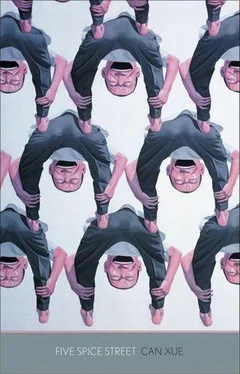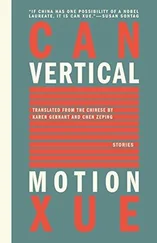Can Xue - Five Spice Street
Здесь есть возможность читать онлайн «Can Xue - Five Spice Street» весь текст электронной книги совершенно бесплатно (целиком полную версию без сокращений). В некоторых случаях можно слушать аудио, скачать через торрент в формате fb2 и присутствует краткое содержание. Год выпуска: 2009, Издательство: Yale University Press, Жанр: Современная проза, на английском языке. Описание произведения, (предисловие) а так же отзывы посетителей доступны на портале библиотеки ЛибКат.
- Название:Five Spice Street
- Автор:
- Издательство:Yale University Press
- Жанр:
- Год:2009
- ISBN:нет данных
- Рейтинг книги:5 / 5. Голосов: 1
-
Избранное:Добавить в избранное
- Отзывы:
-
Ваша оценка:
- 100
- 1
- 2
- 3
- 4
- 5
Five Spice Street: краткое содержание, описание и аннотация
Предлагаем к чтению аннотацию, описание, краткое содержание или предисловие (зависит от того, что написал сам автор книги «Five Spice Street»). Если вы не нашли необходимую информацию о книге — напишите в комментариях, мы постараемся отыскать её.
they
Five Spice Street
Five Spice Street — читать онлайн бесплатно полную книгу (весь текст) целиком
Ниже представлен текст книги, разбитый по страницам. Система сохранения места последней прочитанной страницы, позволяет с удобством читать онлайн бесплатно книгу «Five Spice Street», без необходимости каждый раз заново искать на чём Вы остановились. Поставьте закладку, и сможете в любой момент перейти на страницу, на которой закончили чтение.
Интервал:
Закладка:
In our discussions, we used to squeeze together, head against head, smelling each other’s breath. Then, we lowered our voices, making them fainter than the buzzing of mosquitoes. It was as if we weren’t talking at all, just moving our lips. We could only guess what others were saying from the movements of their lips. Certain ideas were communicated in a very subtle way. For example, ‘‘spare-time recreation’’ was not completely the same as sex, but neither was it completely the same as ‘‘platonic friendship.’’ These are both extreme interpretations. We couldn’t accept either; but arguing against one view wasn’t the same as advocating the other. We had to distinguish the boundaries. And we distinguished on the basis of barely perceptible lip movements. Only the in-group could understand the profound meaning of these movements. If the lights weren’t on, we reached our conclusions on the basis of buzzing sounds.
This kind of get-together was so interesting. Everyone was left with lasting memories. Today, years later, many still sigh and say they wish time could reverse itself-if only it could stop in that moment filled with mysterious conviviality, if only they could enjoy once more that grand throbbing of body and mind, they wouldn’t mind having their lives cut short by a decade or two. That joy is gone forever. Only bleak melancholy remains. Those get-togethers in pitch-dark rooms, those swaying ghostly silhouettes on the walls, those voiceless furtive whispers, and the excitement of imagining oneself in the leading actor’s role during long sleepless nights: where did all of these things go? Such sweet memories! If a person has the good fortune to reenter that realm once or twice when he is old, he can die without regrets. The writer lost no time joining in. Of course, he didn’t go to hear them ‘‘say something.’’ If he’d been motivated only by this, he would have run into a wall. The old ways were dead. You had to innovate because you couldn’t ‘‘really hear’’ what anybody said. It was a thought movement, highly sentimental and inferential. Comprehending it depended on ‘‘intelligence.’’
The writer had quite a lot of talent and after hard practice gradually grasped certain main points that allowed him to enter that realm and obtain a lot. He transformed his old flamboyant, shallow writing style into one that stressed character and true feelings in a dignified way. He got rid of priggishness and turgid prose; he noted his feelings and embellished them imaginatively to represent reality.
The First Point: How Did X and Q’s Adultery Begin?
Let’s start our analysis with Mr. Q. As we said, he is a good husband and father with a devoted wife and two sons. They all love the rural life, growing melons and vegetables in their front and back gardens and raising cats, dogs, and rabbits. His only shortcomings are being superstitious and believing in fate. But it’s precisely this that broke up his family. Ever since that lovely afternoon when he went calling and Madam X secretly told his fortune in that stifling room (we have no way of knowing the details), he changed into a person who had lost all reason and common sense. Sometimes, he unexpectedly even acted like a gangster: he was completely different from the simple, honest person he’d been before.
He announced to a friendly colleague: from now on, he would give up his self-restraint and be guided by destiny. This was providence, whose force was overwhelming. He had no way to resist it. All he could do was submit. If in the future this did him in, that was also providence. His eyes were wide open, his pupils unmoving, as he said this, and his teeth ‘‘chattered.’’ His colleague asked what was going on, but he didn’t hear and just spoke vaguely of some intersection, something about Wednesdays. He was agitated and his voice was shaking. Then he crowed like a rooster: his voice was magnificent. He kept crowing. His neck was puffy and his face reddened. His colleagues shouted for help, but he calmed down: ‘‘This is the way I am,’’ he told them. ‘‘All of you can see this. I’ve been a little crazy all along, though I covered it up well. When I sit at my desk in the office, I’m often seized by an impulse to jump up on the desk and crow like a rooster, as you just saw. For years, I’ve kept myself from doing this in public.’’
After the adultery began, vague news of the scandal reached the office where he worked. His good colleague advised him to ‘‘end it’’ to avert trouble. He not only didn’t feel grateful but blamed that person for not helping him. He castigated him for being a ‘‘time- server,’’ ‘‘a hypocrite,’’ ‘‘hard as nails,’’ and so forth. He also began shouting and smashed the window with a hammer. In short, he became someone else, doing all sorts of unimaginable things. His colleague had no choice but to forget his good intentions and resume his usual gloating manner. There’s no evidence that Q wanted to ‘‘end this.’’ Rather, he was like dry wood going up in a blaze. He paid attention to nothing else. He became irascible. ‘‘Just try that again,’’ he’d say, grabbing your arm if he thought you said anything suggestive. Only after all kinds of sophistry and excuses by the other person would Q let go. One day, his superior handed him an assignment. He accused his superior of making things difficult for him, and a fist fight broke out. He actually ‘‘grabbed the superior’s head and smashed it against the wall until it bled.’’ He groaned and told people trying to intervene that he would ‘‘resign’’ and go off and ‘‘be a beggar.’’ The others were speechless with fear. Madam X’s sister said that Q had told her several times: he was predestined to have no way out, and so he had resolved to do something in desperation. His eyes were bright when he said this, and his face shone with a beatific luster. ‘‘There are still eyes like this in the world. Up to now, I still haven’t figured out what makes your sister tick.’’ Yet, his eyes told people that he knew very well what made her tick. Knew too well. He just didn’t know what he himself was all about. If he did, God knows what might happen. How come a good man can change overnight into a gangster, a crook? There’s got to be an explanation. The only conclusion we can reach is that the fortune-telling incident was the cause.
At one time, Mr. Q had embraced nihilism, and had been confused for thirty or forty years, and now suddenly he had started talking about waves in eyes and how some mysterious power had arrived. Of course, it was all nonsense: the sticking point was his superstitious thinking and passive attitude toward life. It’s said that he has worried about calamities ever since he was eleven, worried that death would befall him before he had a chance to say good-bye to friends. He had always been frightened when walking on the street, and he also began to suffer from insomnia, ‘‘as if numerous rabbits were running out of my head.’’ That’s how he described it. What on earth was that instance of fortune-telling all about? Our Mr. Q had walked unsteadily onto Five Spice Street and helped the felt-hatted widow push the coal cart. Then he ‘‘stood for seven or eight minutes’’ in her home. After emerging, he ‘‘encountered’’ the lame woman, and finally he ‘‘passed out’’ and fell at the entrance of Madam X’s home. No one saw how he got inside. Could it be that everything that happened later was only a matter of ‘‘flickering eyeballs’’? (This also brings ‘‘hallucinogens’’ to mind. Was it possible that in the instant he was unconscious, he had been injected in a barbaric way? Wasn’t ‘‘Phantoms in the Boarding House’’ playing then?) Waves were projected and the man’s destiny was decided! Mr. Q has never divulged this detail, because ‘‘there’s no way to recount this episode,’’ ‘‘any language is a kind of blasphemy,’’ ‘‘the moment I express this, I’ll be dizzy,’’ ‘‘this definitely can’t be translated into words,’’ and so forth. He simply spoke of ‘‘how bright’’ it was when he talked with the eyewitness, X’s sister. Although that idiotic sister was there, she ‘‘couldn’t see any of the evidence’’ and innocently told people, ‘‘I can vouch for this: it was love at first sight. Neither of them said a word, nor did they touch. They were just silent. That proved the strength of their sentiments and their morality.’’ ‘‘As for telling his fortune, who says so? That didn’t happen.’’ On the surface, it seemed that ‘‘there wasn’t any’’ fortune- telling. It’s exactly this ‘‘nothing’’ that was the basis for everything that came later. Everything germinated in the midst of supposition. In this glaring light, Mr. Q completed his metamorphosis from a pupa to a butterfly. He bit off his shell and fatefully changed. (This was exactly what Madam X was so good at: using invisible idiodynamics.)
Читать дальшеИнтервал:
Закладка:
Похожие книги на «Five Spice Street»
Представляем Вашему вниманию похожие книги на «Five Spice Street» списком для выбора. Мы отобрали схожую по названию и смыслу литературу в надежде предоставить читателям больше вариантов отыскать новые, интересные, ещё непрочитанные произведения.
Обсуждение, отзывы о книге «Five Spice Street» и просто собственные мнения читателей. Оставьте ваши комментарии, напишите, что Вы думаете о произведении, его смысле или главных героях. Укажите что конкретно понравилось, а что нет, и почему Вы так считаете.












